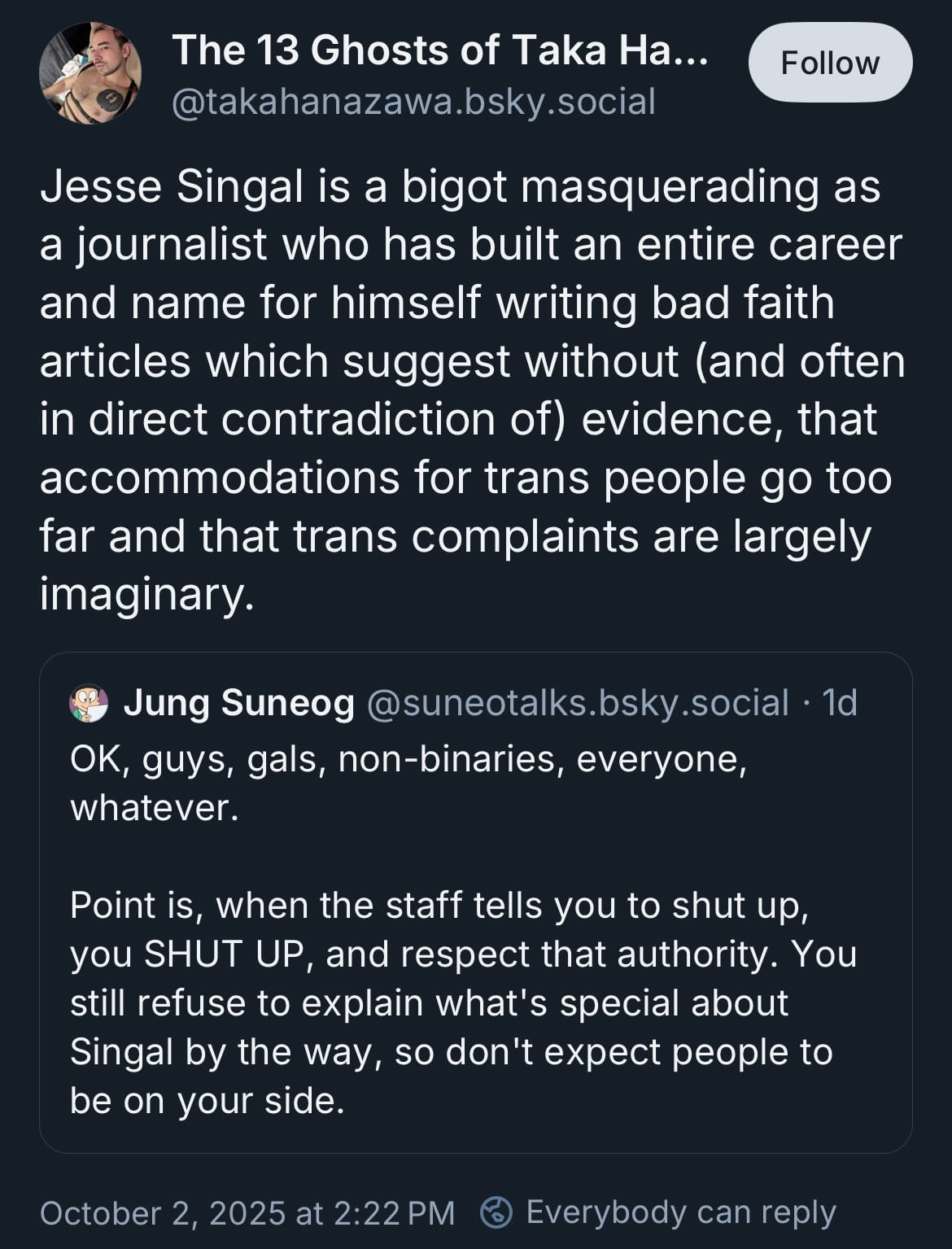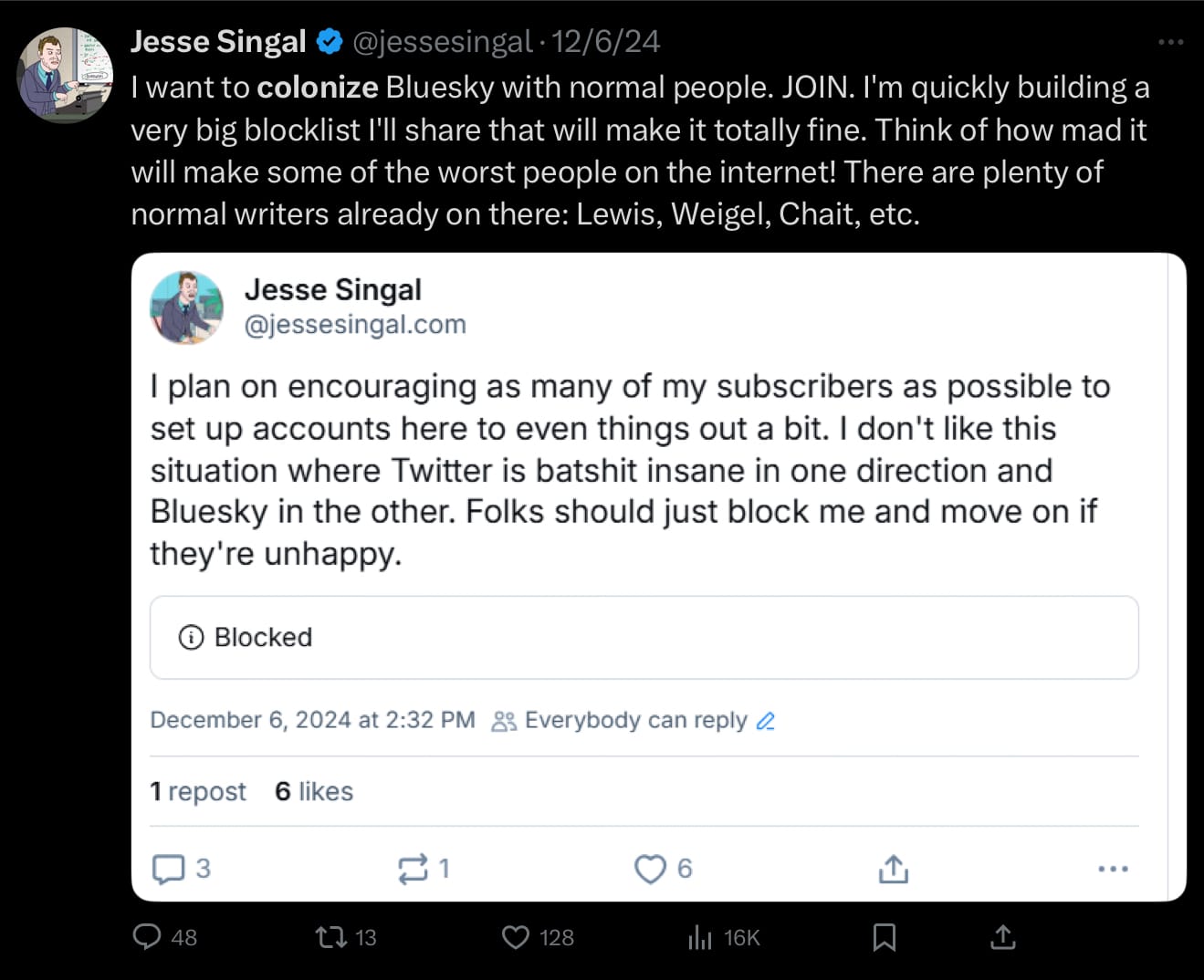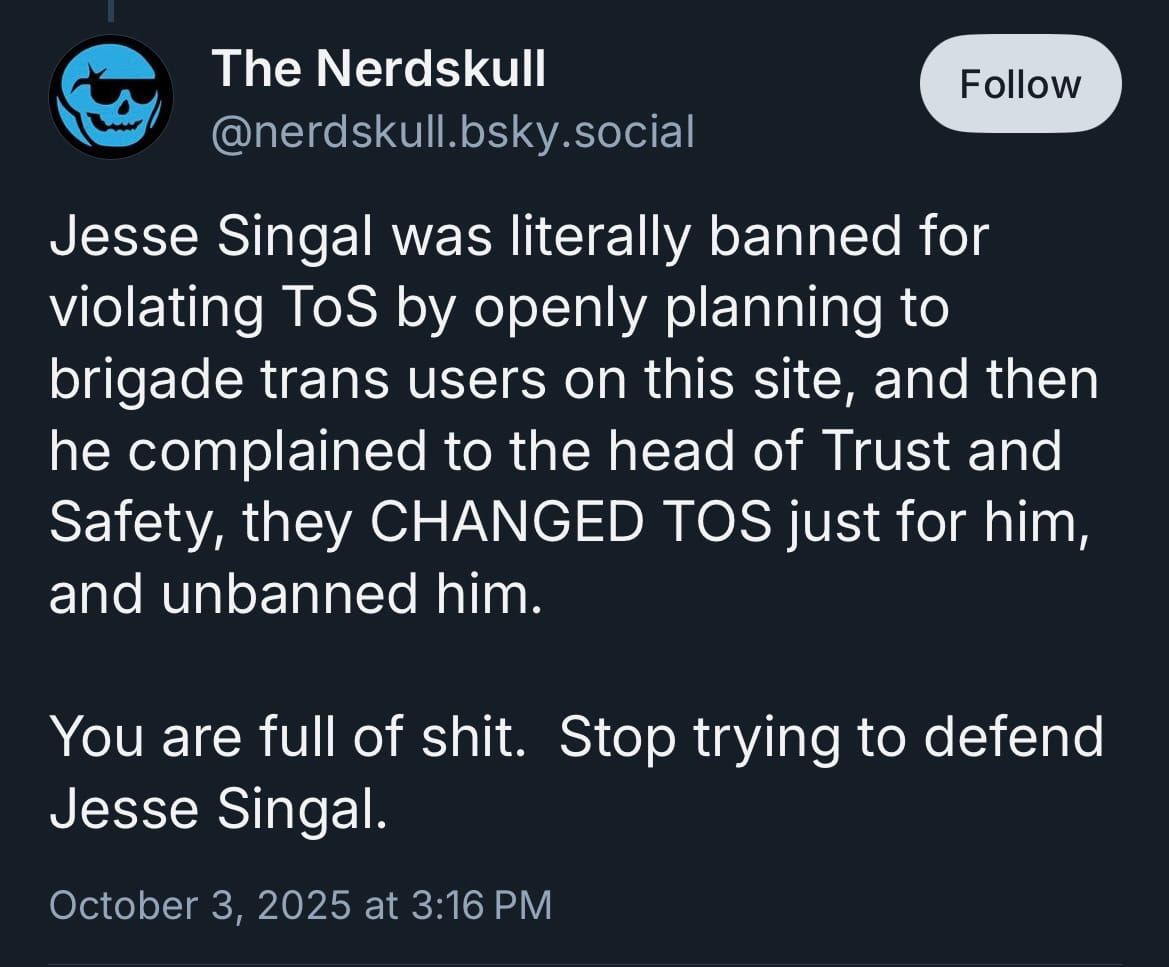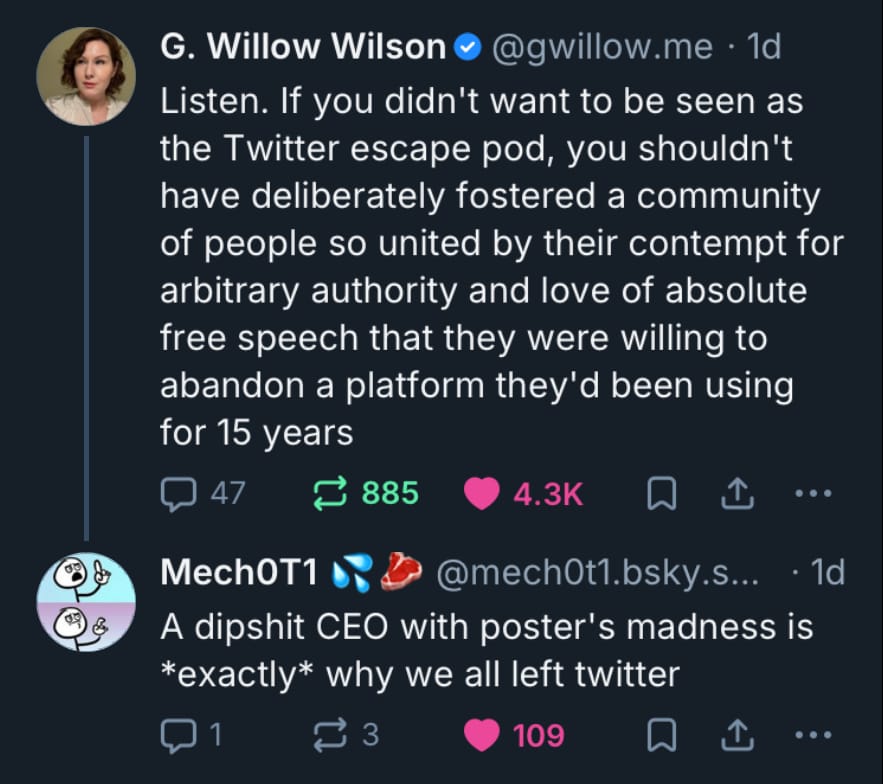Bluesky Blues
Bluesky, originally a research initiative developed at Twitter, became its own company in 2021. It is described as a “micro-blogging” social platform and is classed as a “Benefit Corporation” with an explanation of its particular structure and function found on its Wikipedia page. The main takeaway is that Bluesky functions with something called the AT Protocol (pr. “at” not “Ay-Tee”) which is, frankly, above my pay grade (0$) to understand or get into regarding software schematics or intent. One benefit to Bluesky as opposed to its predecessor, Twitter, is that it has a fledgling process of independent moderation practices which allows for a better methodology for “building” one’s timeline and avoiding things that aren’t aligned to your personal vision of social media. As one can imagine, due to Bluesky’s status as the operating example of this approach to social media networking and internet usability, the people who work on the site are pretty hardcore into software. I mean, who wouldn’t be in their position, right? There’s a little trouble with that, though, since they aren’t running a software company, they’re running a social media company, and its become apparent from recent posting-through-it incidents that absolutely none of these Millennials rolled high in their Charisma stats which may end up costing Bluesky stakeholders some serious money should they lose large chunks of their user base to administrator foot-in-mouth disease.
It’s a little difficult to parse through everything that happened in order, as internet archeology is a tedious and sometimes-unreliable practice so bear with me. Our first order of business is to chat about our main characters. Lantian Jay Graber (Jay), the CEO of Bluesky, describes herself and her team as “system architects at core” and is more than willing to discuss the AT Protocol and the ins and outs of their “experiment.” Her and her team’s approach to the social aspects of their social network is, at best, abysmal. Her characterization of any kind of pushback against (un)professional decisions or statements as “harassment” alongside a rather open and apparent disdain for her site’s own user base has led to some strained C-Suite vs End User interactions.
Jesse Singal is a journalist who has written articles for major publications in the past. Despite being considered a liberal in most circles in meatspace and online, his Atlantic article entitled “When Children Say They’re Trans” drew significant criticism from trans communities and activists who promote an affirmation approach to kids who claim trans identities. Singal’s article raises questions as to this type of approach, suggesting that perhaps there may be other reasons children might “come out” as trans and immediate affirmation may not be in the child’s best interest if their attraction to a trans identity has been influenced by other factors. Knowing how confusing childhood, puberty, and social environments can be, it’s not hard to imagine why someone would ask these kinds of questions and promote this kind of step-back thinking in regards to such a hot-button issue. Nevertheless, these types of articles and questions are often seized upon by conservative pundits and internet personalities in order to twist narratives to provide a basis for a more hateful ideology masked as “concern” for “vulnerable” elements of society (i.e. “Think of the Children”). His article was criticized even moreso for its “misinterpretation” of data sets and a lack of a balanced approach, focusing mostly upon “desisters” (folks who identified as transgender and then eventually returned to their original gender identity) rather than transgender children who were experiencing the happily-ever-after of gender affirmation.
Singal has since been out to convince the general online public that he’s an expert in the field of transgender issues, but for all of us cynics he’s just managed to convince us that he’s the liberal equivalent of those right wing dudebro podcast grifters. It seems like all he does these days is ragebait in order to lure guests onto his podcast so he can make more money off of being an insufferable twat on the internet. An amazing business model, clearly, and definitely not one that leads to an eventually perforated neck. /s Throughout his dubious career as a journalist and podcaster, he’s been accused of several of the internet’s greatest transgressions including doxxing (undetermined veracity), and brigading (undetermined veracity, though he did make a tongue-in-cheek Twitter post encouraging his followers to join Bluesky in order to fill it with “normal” people). He’s similarly been accused of weaponizing his following in order to send angry reply guys to stalk and harass folks on Bluesky with which he’s had negative interactions, which honestly is a pretty believable accusation considering the amount that this does happen online, especially on Twitter and KF. Nevertheless, my internet archeology skills clearly are not the best, as I’ve yet to find any concrete evidence that many of these accusations stem from actual events.





Various screenshots from Bluesky and Twitter as examples
In the absence of this evidence, the circumstances that have found Bluesky in the clutches of a social media scandal are particularly cringe-worthy. Singal, so universally disliked by Bluesky’s most prominent user base, was the platform’s most-blocked user until his position was usurped by VP Couch-Fucker himself, J.D. Vance, and the platform briefly banned him after his sign-up. It was later determined that Singal simply hadn’t violated any existent rules in their Terms of Service and his account was restored, though the platform was accused of altering their own ToS in order to accommodate Singal’s alleged transgressions (what these were, I’m not certain and nobody seems willing or able to tell me). Due to Bluesky’s unwillingness to ban Singal and the user base’s unwillingness to accept that sometimes people you absolutely hate are going to exist in the same space as you (I have to work at my actual real life job with a Trump voter, I deserve compensation), they’ve found themselves at an impasse.
This impasse isn’t exactly fair in light of some of Bluesky’s most recent controversies, however. When it comes to Jesse Singal and the majority of the user base requesting his ban, Bsky admins insist that the personal moderation efforts are enough, but recently they came out with a Terms of Service alteration that would ban a broad swath of illustrated or written pornography. Apparently it’s too difficult to give NSFW artists and writers moderation tools that would hide their posts from underaged users but it’s perfectly reasonable to expect users to defend themselves against someone who could possibly send flying monkeys to throw shit at them from other sites. Okay. Sure, Jan.

Faced with the ever-growing discontent of users, Bluesky doesn’t seem at all concerned despite that they likely should be. If I were part of their investors, I would be livid right now to find out that the product I had backed is being stewarded by socially incompetent losers who treat it as if it’s a disposable experiment rather than the next billion-dollar Twitter replacement. That these admins are treating their growing and thriving social media ecosystem as a cheap toy just goes to show just how delusional they are about their own place in the corporate structure. Nobody cares about your software, nerds, they care about how much money you can make them. As soon as you become less useful to that end, you’re going to be done. So my suggestion would be to start taking your social media company more seriously before someone else does it for you.
As for us end users? Just keep posting hole. Eventually we’ll come out the other side.

